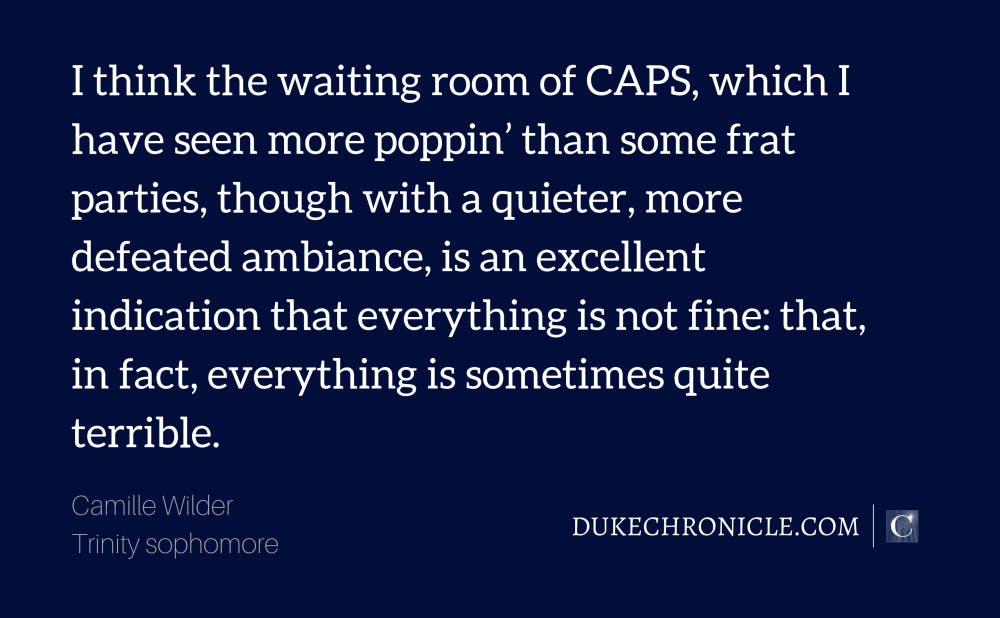I have heard every one of my friends speak to the fact that Duke has made them feel terrible about themselves some point. We often hear of this freshmen year debasement, where all the high school top dogs are knocked down a rung because suddenly life is hard and they’re not hot sh*t anymore. But does Duke’s deprecatory culture go deeper than this? Is the problem just collegiate academic stress—or are we placed in an ideal petri dish for growing colonies of unhappiness?
We love Duke, but we hate our lives. We are taking rigorous academics, doing groundbreaking research, working, managing clubs, and trying to be social butterflies. This is cliche by now—we all know we are overworked and stressed. So we pass it off with, “It’s fine. Everything’s fine.” We’re busy—so what? We don’t sleep enough—so what? Sleep is for the dead, and we need to party and write papers.
Sometimes everything is not fine.
I think the waiting room of CAPS, which I have seen more poppin’ than some frat parties, though with a quieter, more defeated ambiance, is an excellent indication that everything is not fine: that, in fact, everything is sometimes quite terrible.
Upon arriving back in the Gothic Wonderland after a summer away, I discovered one of my friends was also feeling an overwhelming, blinding sense of anxiety. It felt like the world might implode any second, and we had no idea why. It was FDOC—we had no discernible reason to stress (yet). Just being back at Duke made us feel bad, without rhyme or reason. This isn’t to say I wasn’t happy to be back: I was. But I was and still am at times so anxious that I can barely hold a conversation or work.
When people ask me how freshmen year went, and they are not an adult to whom I am obliged to answer, “It was great!” with a serene smile, I say something to the effect of, “It was both very good and very bad.” College is most definitely better than high school. But it’s also like someone has turned up the insecurity dial to 500x. The amount of people I know with eating disorders, or even people who just make the telltale comments about how bad their body looks in passing, has exponentially increased since high school. Most everyone I know has received a grade they are too ashamed to tell anyone about. Many students are either overcommitted to the point where they lose their minds before “taking something off their plate” or feel woefully under-committed, and question why they can’t take 6 classes, be president of 3 clubs, do research, etc. and be a shoo-in for whatever graduate program they hope to attend without going insane. I can’t count on two hands the number of people I know with anxiety or depression because I don’t have enough fingers to accommodate those friends.
It’s as if Duke has taken all of the people who are better than me (smarter, richer, more attractive, more athletic) and put them all in a living, learning community to study who will flourish or fail. If this seems like hyperbole, consider that this is exactly what Duke has done with it’s 9.2 percent acceptance rate. And Duke is only ninth in the rankings. Most Duke students probably ran with the front of the pack in high school and know kids who sprinted to MIT or Harvard or Yale. We can’t talk to them about feeling bad in college because they have it worse. So maybe we reach out to, say, a state school friend. And we discover that they are having a ball, and question why we didn’t go to an easier school where we could remain the best and never have to step down from that pedestal we glided in on from high school.
Everything is hyper-competitive and hyper-comparative, and everyone seems to effortlessly thrive, while I struggle to pick a clean pair of sweats from my drawer.
But this is Duke University, and so students go to classes and work hard, join organizations and pad their resumes. On the weekends (or weekdays), many self-medicate with alcohol and have fun stories for brunch on Sunday morning before hibernating in Perkins until early, early Monday morning. We wonder quietly at night whether we love learning anymore or love the idea that we will make that sweet cash money in medicine or finance or whatever dull path we chose. Or maybe we’re brave and choose to study Art History or Russian literature just because it brings us joy and fulfillment, but then the inevitable question: “What will I do with this degree?”
Failure is not an option, not with $70,000 yearly cost of attendance and all those family members, teachers, and mentors behind you who were thrilled when you got a place at Duke with the brightest and shiniest of futures ahead. And more importantly, you have to believe you will be successful because doing well is your identity—it always has been.
These reflections might seem overly cynical because college is great and fun, and it is, I agree. I have had many wonderful conversations with wonderful people. I have learned a great deal about myself at Duke. I have attended classes that I wholeheartedly loved. But I have also grown tired of feeling bad about myself—about my academic success, appearance, popularity, or substance consumption. The question persists: is this unhappiness just the price of flying so close to the sun as a “gifted” student—is Duke worth it?
Camille Wilder is a Trinity sophomore. Her column runs on alternate Thursdays.
Get The Chronicle straight to your inbox
Sign up for our weekly newsletter. Cancel at any time.
Camille Wilder is a Trinity first-year. Her column runs on alternate Thursdays.

